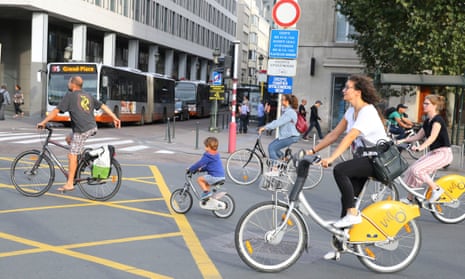I write this from St Martin’s, one of the largest of the Isles of Scilly, where in five days spent among its 120-odd inhabitants I have seen only three moving cars, two tractors and a few boats. With 28 miles of Atlantic ocean in one direction between it and Cornwall, and just a few rocks before the Canadian coastline in the other, St Martin’s has some of the cleanest air in the world.
My landlord, Andrew, sees the benefits. Both his grandparents are 92 and still active, no one he knows has asthma, and lung and heart diseases are uncommon, he says. Harold Wilson always holidayed on the neighbouring island of St Mary’s, but his pipe-smoking never caught on.
Word of the grim state of air on “mainland” UK reaches everyone here. A few days ago came reports suggesting hundreds of thousands of young people in Britain are being exposed to illegal levels of air pollution from diesel vehicles. Then there was new evidence showing that toxic air travels through pregnant women’s lungs and lodges in their placentas. A third study showed how air pollution affects intelligence, and another showed it to be the biggest environmental risk in Europe, causing an estimated 400,000 premature deaths a year. Today, there are reports of a new study suggesting that air pollution increases the chance of getting dementia.
For Scillonians, used to gulping fresh sea air only, this is all academic. But what can people in grossly polluted British cities do about the staggering levels of pollution, apart from escape occasionally to places like St Martin’s? How hard is it really to eliminate most pollution?
Not very, say the cities and countries that have tried to reduce it. It’s not expensive, and it can be politically popular. Indeed, all the research shows that places that reduce pollution benefit financially in both the short and long term.
As a start, we can all experience the less-polluted life. This weekend, as part of World Car-Free Day, London will close 50 major streets to traffic, and Manchester, Leeds, Bristol, Glasgow, Cardiff, Oxford, Cambridge and Liverpool will also ban cars from parts of their city centres. All it has taken is a pledge, a temporary decree and a few plastic bollards.
Birmingham, car capital of the UK, resolutely refuses to join in. Poor Brum. The effect of removing cars on a grand scale from a large city is revelatory. Aside from the rare quietness and extra space, the air smells and tastes different. It may be imaginary, but people also seem to converse and smile more. The health effects are dramatic. Brussels closed its city centre to cars last Sunday, and within hours the levels of black carbon and nitrogen dioxide in the city’s air decreased by at least 30%. Nearly everyone approved.
When the benefits are seen, the rest becomes easy. Many cities that were happy to ban cars from a few streets for a token day a year have now been emboldened by the positive response they received to go much further. Oslo will permanently ban all cars from its city centre by 2019; Madrid will free up 500 acres of its centre by 2020; and Copenhagen, Paris, Brussels, Berlin, Mexico City, Bogotá and Kigali all have ambitious plans for permanent bans.
The car – at least in some EU cities – is on the run. But British and US cities are putting their faith more in technology and individual action. This approach is also beginning to work, with sales of electric cars skyrocketing. This week, we passed the milestone of 4m zero-emission electric vehicles (EVs) on the road worldwide. That’s not many out of more than one billion cars, but the speed of change suggests that the electric car will go mainstream over the next generation. We’re predicted to hit the 5m mark in about six months’ time, with one in four to five cars built predicted to be all or partly electric within a decade. This may not dramatically reduce pollution unless the electricity they run on is renewable, but individuals should at least be able to opt to “fill up” on clean electricity.
But technology is not enough. The air will never meet even the lowest World Health Organisation standards until governments accept that cars must be removed from the street altogether, and major investments be made in walking, cycling and public transport.
Countries that have invested in pollution-free transport have reaped the benefits. Academics calculate that Dutch investment in cycling not only prevents about 6,500 deaths each year, but saves government spending of nearly £20bn a year, as well as lengthening average life expectancies by six months.
The Royal College of Physicians recommends, for a start, that we spend £10 a head on alternatives to cars: far less than planned spending on new roads. It could be enough to kickstart an emission-free economy that is good for health, the climate and the pocket.
As individuals, we can learn to avoid heavily polluted streets by taking backstreets; apps can show us in real time where the pollution hotspots are; and we can avoid buying diesels or sitting in front of open fires. These all offer individual respite from the clouds of gases and particles we emit, but will not bring about real change.
We must also understand that air pollution comes not just from cars but from ships, farming, heating of houses and workplaces, and the burning of firewood and rubbish. We can wean cars off fossil fuels, but that is just the start. Ultimately, we need to both get out of our cars, and burn fewer fossil fuels.
For that to happen, we need to think very differently about how we live. On St Martin’s in the Isles of Scilly, it’s just about possible to imagine that.
